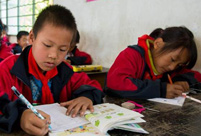 'Model husband' shatters image of love
'Model husband' shatters image of love
 Can animals smile? Or put on a happy face
Can animals smile? Or put on a happy face
 Geng Xuan crowned at 9th China Super Model Contest
Geng Xuan crowned at 9th China Super Model Contest
 Top 10 billionaires in the liquor industry
Top 10 billionaires in the liquor industry
 Backstage at China Fashion Week
Backstage at China Fashion Week
 Ballerinas anywhere but onstage
Ballerinas anywhere but onstage
 Top 10 safest airlines in the world
Top 10 safest airlines in the world
 Posters of 33rd HK Film Awards unveiled
Posters of 33rd HK Film Awards unveiled
 Top 10 most popular instant messaging apps in the world
Top 10 most popular instant messaging apps in the world
 Inspiring shadow images of Chinese army
Inspiring shadow images of Chinese army
SOLUTIONS
To improve the environment, China must drop a GDP-oriented development model and take its environmental capacities into consideration when making economic development plans, said Zhong Maochu, a professor at Nankai University in Tianjin Municipality.
That is particularly true for Beijing right now, as the city streamlines its industrial structure.
The municipal commission of development and reform confirmed with Xinhua on Thursday that it has not yet made a list of the "most energy-consuming and highly polluting" enterprises to be relocated to neighboring cities.
However, it does encourage enterprises to improve their pollution control facilities to ensure they can remain in Beijing, said a commission official who is familiar with the situation.
"Beijing has paid a remarkable environmental cost for pollution.Considering Beijing's role in the country, the removal of polluters from the city is inevitable," said Niu Fengrui, a researcher with the Institute for Urban and Environmental Studies under the Chinese Academy of Social Sciences.
The government, however, should take more measures to encourage enterprises to upgrade their production technologies to reduce pollutant emissions and to lessen energy consumption voluntarily, said Niu.
"Financial support for the key enterprises is a good way of doing this," said the researcher.
Beijing published a guideline in 2007 on the management of polluting enterprises, vowing to close or remove all small plants processing concrete, paper, chemicals, casting products, printing and dyeing products, electroplate products, and plate glass.
The city plans to either close or upgrade 300 highly polluting enterprises in 2014, and the number is expected to reach 1,200 by the end of 2016, when annual industrial coal consumption will be reduced by 2 million tonnes annually, the commission added.
A set of measures was already rolled out in 2013 to tackle Beijing's environmental problems.
In September, the local government unveiled a five-year plan (2013- 2017) to improve air quality through means including slashing coal consumption, promoting clean energy use and reducing production capacities with heavy pollution.
That followed a three-year plan (2013-2015) being issued last May to improve Beijing's waste water treatment and promote the construction of water recycling facilities.
According to the environmental protection bureau, last year saw 44,000 households in downtown Beijing bid farewell to coal-fired stoves and start to use electrical heaters.
The city also replaced 366,000 high-emission vehicles with new ones and raised environmental standards for enterprises. The construction of highly polluting and energy-intensive facilities was forbidden, and fines for emissions of major pollutants were raised.

 Wonderful moment of China's airborne forces
Wonderful moment of China's airborne forces Bai Baihe shoots for fashion magazine
Bai Baihe shoots for fashion magazine Red terraced fields in Dongchuan of Yunnan
Red terraced fields in Dongchuan of Yunnan Jiaju Tibetan Village
Jiaju Tibetan Village Spring dating
Spring dating Confucius institute at UC Davis
Confucius institute at UC Davis Little painted faces at temple fair
Little painted faces at temple fair Top 10 safest airlines in the world
Top 10 safest airlines in the world Foreign students at China-Myanmar border
Foreign students at China-Myanmar border The backstage of the Fashion Week
The backstage of the Fashion Week College students in Han costumes
College students in Han costumes Postgraduate works as waitress
Postgraduate works as waitress Life in a Lahu village in Yunnan
Life in a Lahu village in Yunnan An orphan’s wedding
An orphan’s wedding Hollywood documentary brings Diaoyu Islands truth to new audience
Hollywood documentary brings Diaoyu Islands truth to new audienceDay|Week|Month